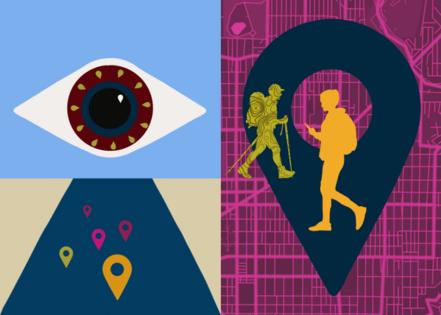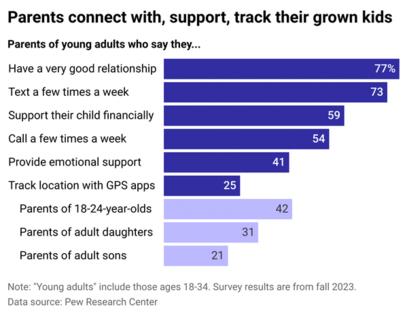Somebody's watching me: How location tracking is impacting parents' relationships with their adult children
Published in Slideshow World
Subscribe
Somebody's watching me: How location tracking is impacting parents' relationships with their adult children
Marcus Hadden, a father of three from central New Jersey, texts and talks with his oldest son, a college sophomore, a few times a week. His 19-year-old son attends Rutgers University just a half-hour away, but Hadden said the easy communication has helped them feel closer. Occasionally, his son, a dedicated hiker, shares his phone's location with his parents.
"We don't monitor him, but if he's out hiking on a remote trail, which he does most weekends around the tristate area, it feels like a good idea to have it for safety," Hadden told Stacker. "The younger two are in high school, so they don't have a choice, but when they become an adult it's different."
Hadden said he doesn't want his son to feel he's always under his parents' thumb. "It's a balance between letting him know we're there and letting him feel he can be on his own and that we trust him," he said.
Hadden's experiences echo that of many other parents with adult children in a tech-saturated age. A recent Pew Research report found that many parents monitor and check in with their adult children daily. Tile analyzed Pew's 2023 survey data to examine modern relationships between parents and their adult children and technology's role.
The report, which defined young adults as those ages 18-34, found that 1 in 4 parents track their child's location with GPS apps, even if only occasionally. Rates were higher among those with kids under 24 and among parents of young women. Three in 4 parents text their adult children a few times a week, with over half of them calling at least that often.
Most young adults feel comfortable with their parents' involvement. Fewer than 1 in 10 young adults say their parents are too involved, and nearly 1 in 4 (22%) said they wanted their parents to be more involved.
Visit thestacker.com for similar lists and stories.
How parents and grown children interact
Meg Jay, a developmental clinical psychologist and the author of "The Twentysomething Treatment" and "The Defining Decade," said she's experiencing the dynamics firsthand, having recently dropped her son off at college. Jay, a self-described "nontracker," was surprised by how many parents actively track their children.
"Tracking your child's location impinges on their autonomy and privacy, but it also has an effect on the parent," Jay said. "Knowing too much about your adult child can create unnecessary anxiety and stress…not to mention that it often puts parents in the position of knowing things their kids may not know they know, and then having to figure out how to talk to them about it or how to just stew about it."
Jo Ellen Kaiser, a media executive in San Francisco, says she kept close to her 27-year-old daughter with daily texts and calls when she was away at college on the East Coast before moving back to California.
"One of our critical jobs as parents is to help kids become adults, which means in part learning to take responsibility for their own actions and lives," Kaiser said. "If a kid knows you are tracking them, they could reasonably believe that someone would be there to rescue them, to take care of whatever issues arise. Not only is that not the case, but that attitude is counter to the independence we as parents should want."
Striking the right balance between connection and independence
Amy Naaman, a mother of two daughters in their early 20s, said location tracking, along with frequent texts and calls, has helped them stay connected. Naaman, who lives in Santa Barbara, California, says that her youngest daughter, 21, who is at college in rural Massachusetts, gives her parents full location access.
"I can see where she is at any time, and I probably check it a couple times a week, usually to make sure I am not calling her if she is driving," Naaman said. "My older daughter just shares her location with me when she goes out on dates or meets up with people she doesn't know well in locations she is less familiar with."
The older daughter, Zohar, a 23-year-old graduate student at the University of Colorado, agreed that technology has allowed her family to remain close without becoming a source of contention. They talk once a week by phone and use family group chats daily.
"I miss my parents, but I feel better when I am the one reaching out to them rather than them calling me. I want to have the choice of how to be connected, rather than it feeling like surveillance," Zohar said. "It's more like adults talking about life than my parents just checking up on me."
Zohar said her current level of connection with her parents feels right. "I feel comfortable telling them if I want more, but right now I don't—what feels good to me is having an independent adult life and knowing that I have them there when I need them," she said. "If I go on a date and want another person to know where I am, then I share my location with them. It doesn't feel like surveillance in those cases because I have chosen it."
The value of setting healthy boundaries
The Pew survey found that nearly half of young adults turn to their parents for advice on finances, work, or relationships. They also continue to rely on their parents for financial and emotional support as they work toward independence. But, as the parent-child relationship evolves into adulthood, both parties may need to continually reevaluate their boundaries.
Zohar, when asked if she would rather have the greater autonomy that her parents' generation enjoyed as young adults, said she wouldn't want things to change.
"I have heard from my parents that they actually felt under-surveilled when they were my age," she said. "And I feel lucky that my parents care enough to check in and discuss the options of location tracking and how to be in touch and then respect me enough to listen to what I feel comfortable with."
Laurence Steinberg, professor of psychology and neuroscience at Temple University and author of numerous books on adolescence and young adulthood, including "You and Your Adult Child," said that location tracking can be useful as long as "both parents and child see this as a protective activity, rather than a suspicious one."
In other words, location tracking is no substitute for open, honest communication. "The basis of a strong parent-child relationship is trust," Steinberg said. "I certainly would not recommend that parents track their adult child's whereabouts secretively."
While much of the location tracking debate focuses on trust, Jay notes that the more pernicious effect is the potential to undermine confidence: "It communicates to your child that you don't believe in them to make good choices or to succeed without you."
Jay's favorite population is young adults, so she is thrilled her child is finally in this age group. "I enjoy receiving texts from my son about some new cool college thing he's doing or about some piece of advice he's seeking; finally, he's (somewhat) interested in what I have to say! That said, I let him drive the timing and frequency of our communications, and I have a strict (self-imposed) rule not to check his location—ever."
Story editing by Alizah Salario. Additional editing by Kelly Glass. Copy editing by Kristen Wegrzyn.
This story originally appeared on Tile and was produced and distributed in partnership with Stacker Studio.










Comments